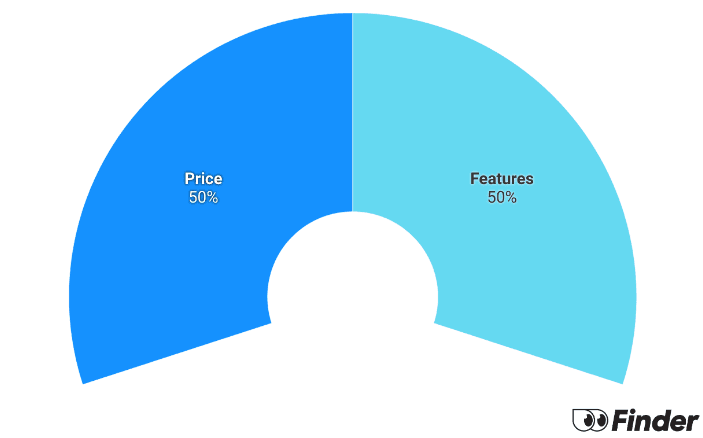Key takeaways
- Many health insurers often provide optical cover as part of their extras policy offerings.
- An extras policy with optical cover can help pay for the cost of glasses and contact lenses from around $3 a week*.
- Optical insurance policies will all have a maximum annual benefit, as well as a 2-month waiting period.
What is optical cover?
Optical health cover is a type of cover you can add as an optional extra to your private health insurance policy. As the name suggests, optical cover can help you pay for any treatment or procedure regarding your eye health.
What optometry costs will your health fund cover?
While cover will vary depending on your policy, you can receive optical cover for:
- Check ups and examinations
- Glasses and contact lenses
- Eye disease
- Eye surgery for medical issues
- Vision therapy
- Laser eye surgery
| Optometry service | Does Medicare cover it? | Can private health insurance cover it? |
|---|---|---|
| Check ups and examinations | Yes | Yes |
| Eye surgery for medical issues | Yes | Yes |
| Eye disease | Yes | Yes |
| Glasses and contact lenses | No | Yes |
| Vision therapy | No | Yes, as an extra |
| Laser eye surgery | No | Yes, as an extra |
Source: https://www.health.gov.au/topics/medicare/about/what-medicare-covers
Extras policies that cover optical health insurance
Here are some extras policies with optical cover from Finder partners. All prices are based on a single individual with less than $101,000 income and living in Sydney.
Finder Score - Health Insurance Extras
Each month we analyse over 10,000 extras insurance products and rate each one on price and features. What we end up with is a nice round number out of 10 that helps you compare extras cover a bit faster.
We want to compare apples to apples, not apples to apple pie. It doesn't make sense to compare a top extras policy with coverage for hearing aids and braces against a policy designed only for dental. So we've separated all the extras policies on the market into pools and categories. Once in their pools and categories, each product gets a price score and a features score, which are then combined to give the Final Score.
Are glasses and contact lenses covered by health insurance?
Australian private health funds provide cover for a wide range of optical services and treatments through their extras cover policies. Some of these include:
- Prescription glasses and contact lenses
- Rebates on prescription sunglasses and prescription swimming goggles
- Eye check-ups
As every insurer offers varying extra covers policies, it's important to review the product disclosure statement (PDS) to ensure you'll receive coverage for the things that matter most to you.
Health insurance for major eye surgery
If you want insurance for major optical procedures, you'll need a more comprehensive plan that you would need for basic optical. If you want health insurance for cataract surgery, you’ll need to take out hospital cover. Specifically, you'll need a gold-tier hospital policy.
If you want health insurance for laser eye surgery, you'll need a specific top-tier extras package that covers laser eye treatment. There are only a handful of products on the market that cover this, mostly because the cost of laser eye surgery is so high. Be sure to check our guides on this before you make a decision.

"I was in need of a new pair of glasses and knew that ahm has an extras policy with a no waiting period on optical. I took out a policy, got my eye check and 2 new pairs of glasses and was able to claim the full cost back immediately. The policy cost me $16 and I was able to claim back $200, which was the exact cost of my new glasses. "
What should I look for in a health insurance policy?
If it's your first time shopping around for a health insurance policy, there are some terms and conditions you should look out for to ensure you find the best optical extras cover for your circumstances.
Exclusions
Exclusions are the things that aren't covered by your private health fund. Some frequently encountered exclusions are:
- Treatment outside of Australia. If you want to head abroad for cheaper laser eye surgery, for example, most health funds won't cover that. You might consider medical tourism insurance instead.
- No cover unless there is a specific, named health issue involved.
- No cover for additional costs like administration fees.
Limits
These are the maximum amounts your policy will pay in benefits, or how much you can claim before your benefits cap out. Your policy may have yearly or lifetime limits for a number of treatment sessions or an amount of money paid out.
- If the cost of a treatment is more than the limit of your policy, you will only be covered up to that limit and must pay the rest yourself. This is sometimes refered to as the 'gap'.
- In the case of family or couple policies there may be limits for individuals as well as limits for the group as a whole.
- Some no-gap optical policies do exist, if you would prefer not to pay any extra.
Excess
A health insurance excess is an additional amount you must pay when making a claim. If more than one excess applies, you must pay the total sum of all applicable excesses. Generally, excess' are only a feature of hospital policies, as well as combined policies.
- Age related excess. The older you are the higher your risk levels. Certain age groups have this additional excess.
- Hospital excess. If someone on your policy goes to hospital this excess will apply to cover the additional costs involved.
- Special excess. Pre-existing conditions, ongoing health issues or a history of making many claims will drive up your special excess.
FAQs
Sources
More guides on Finder
-
Are vaccinations covered by health insurance?
While COVID-19 vaccinations are free in Australia, other vaccines with out-of-pocket costs can be covered by private health insurance with some extras policies.
-
Health insurance for chiropractic treatment
Get discounts on your chiropractic treatment with private extras cover.
-
Health insurance for remedial massage
Remedial massage can help ease pain from general wear and tear as well as specific injuries. This treatment isn’t covered by Medicare but is included in private health insurance extras cover. Find out how private health insurance can cover you for remedial massage therapy.
-
Health insurance for blood pressure monitors
Find out when blood pressure monitors will be covered by Health Insurance and what you stand to receive in a claim.
-
Travel vaccinations and health insurance
Before you travel it's crucial to protect your health from risks found in popular destinations. Learn how extras health insurance can help pay for them.
-
Health insurance for physiotherapy
Physiotherapy services can be beneficial at any life stage, so it could be worth considering and comparing extras health insurance that can cover the cost of this type of treatment.
-
Health insurance for non-PBS pharmaceuticals
If you're wondering what pharmaceutical costs are covered by private health insurance, we've got a guide to health cover for non-PBS pharmaceuticals here.
-
Health insurance for laser eye surgery
finder.com.au explains how the private and public health system in Australia handles optical procedures and services.
-
Health insurance with gym benefits
This guide takes a look at private health insurance in relation to gym membership and other health-related services.


